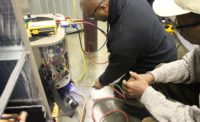Qualified HVAC technicians are desirable commodities.
When HVAC contracting owners get their hands on good techs, they’re willing to go to great lengths to keep them in their uniforms.
However, even seasoned technicians make mistakes. Thus, when disciplinary action is required, how strict can a contractor be without jeopardizing an employee’s future with the company?
NOT AN EASY SUBJECT
Employee discipline is a topic that few — not ownership, management, or employees themselves — get excited to discuss. When the subject of employee discipline was raised, Matt Bergstrom, president of Thornton & Grooms in Farmington Hills, Michigan, said, “The fun part of all our jobs is discipline … not.”
So, where do contractors start? How do they implement rules, procedures, and policies that encourage a positive working environment while also letting employees know that disobedience will not be overlooked or taken lightly?
“Start by reviewing your rules to make sure they’re reasonable and contribute to the company culture you want,” said Carter Stanfield, author of the “Fundamentals of HVAC/R” textbook. “Don’t build traps for yourself by having a lot of rules that employees cannot adhere to.”
Those rules can vary wildly depending on the company. In a previous article, some contractors said they instituted a “zero-tolerance” policy for things like smoking on or near the job site, having visible tattoos, or interacting with customers when their work clothes were dirty. Others were more flexible, putting the trustworthiness and honesty of employees above implementable rules.
“There are a couple of components, such as safety, performance related to skill, knowledge, and overall job performance, that some may include or exclude when generalizing and saying rules,” said John R. Smith Jr., operations manager of the University City Science Center in Philadelphia. “Then, there are issues, such as attire, excessive absence, lateness, language, etc., which I categorize as professionalism.”
Smith believes some areas allow for flexibility while others simply don’t.
“The ‘trap’ one creates is setting past practice, both from a legal standpoint and then trying to change the practice/culture later if conditions change,” he said. “[Employers need to have] clear and concise documentation of issues and reduce to writing any discussion while including the reasoning for the actions taken, because it can prove extremely useful down the road.”
Matt Rutland, HVAC service manager at Brothers Air Heat & Plumbing in Rock Hill, South Carolina, said if there has been a transgression, there needs to be a corrective action.
“The key to me is the corrective part,” he said. “My goal as a manager is not to punish an employee, but rather to correct the improper behavior. The idea is to help him or her improve and get past the improper behavior. I will not take unnecessary action to correct the behavior, and I will use progressive discipline principles once an action has been taken if the behavior continues.”
DEFINING THE CULTURE
The culture aspect is an especially intriguing one because, as Smith said, each company creates and maintains its own unique environment within the workplace.
Bergstrom believes that having a set of core values that does not waiver in the face of a technician shortage or any other form of adversity is critical to the success of a company.
“We got a lot better at [employee discipline] when we decided to clearly, define our culture,” he said. “[That culture includes] our core values [who are we, what we stand for], vision [where are we going], and mission [how are we going to get there.]”
For Bergstrom, recognizing and defining those three values made discipline a lot easier because it gave him something to consistently point back to and made it about working with the employee to tackle a core value. “It takes a good portion of the onus off the manager and points it to a core value that is part of the organization’s DNA,” he said.
Thomas Krygsheld, owner of Illiana Heating & Air Conditioning Inc. in Cedar Lake, Indiana, and a 2015 winner of The NEWS’ Best Contractor to Work For contest, said there are usually issues under the surface with any new hire because of the state of the job market, but it’s still important to see if they have the right skills and attitude to be a part of the team.
“We just hired someone, and we will have him with our techs for a few months, train him the way we want him trained — the Illiana way — and allow him to ask questions and get any training that he needs,” he said. “We look for soft skills and the law-abiding kind of things, drugs, alcohol, etc. We look for people with great personalities who can come from anywhere.”
And when dealing with the personalities of each employee, Bergstrom said staying consistent while not nagging anyone can be difficult.
“Discipline has to make sense to your organization, because, if it doesn’t, then no one understands what’s right and accountability to discipline becomes so hard,” he said. “We battled this confusion area for a long time and, at times, we still do. It’s always hard to clearly communicate in a growing organization that is also adding new leaders, as well.”
THE COMPANY VAN
Rutland detailed one of the most common examples of improper behavior is an unkempt company van.
“I expect my vehicles to be clean and organized,” he said. “And, apparently, my definition of a clean and organized vehicle differs dramatically from that of the technician’s.
“Point blank, a company vehicle is a privilege, and it sends a message to everyone who sees it. If you don’t take good care of your vehicles, then how is a customer to trust that you will take care of his or her home? I set a clear expectation that our trucks are to be clean and organized. I conduct random truck inspections and sometimes find that trucks are not meeting our standards. As a result, I have several options at my disposal: I could yell at the technician, but, in reality, all that does is alienate me from my employees, which is the opposite action any manager wants. I could take his truck away for a period of time, and, while this approach may be effective, it could also create logistical issues.
“Finally, I could correct the behavior by having the truck completely cleaned from top to bottom, which solves the problem of the dirty truck and generally is a wake-up call to the technician,” Rutland said. “I typically have the technician completely clean the truck. The employee backs it up to the warehouse and completely empties it of everything except the shelves. Once the truck is cleaned and washed, then it may be reloaded and returned to the road. I’ve found this approach to be effective while not making the technician feel attacked or belittled.”
According to Rutland, the lack of qualified technicians available certainly makes losing any employee more painful. However, if you want to build a high-quality company, you cannot allow yourself to be timid when enforcing your standard out of fear that you may lose an employee, he said.
“Good employees do not want to work in an environment where there is no discipline,” Rutland added. “Failure to correct an employee who is having an issue could cost you some of your best employees.”
Publication date: 3/7/2016
Want more HVAC industry news and information? Join The NEWS on Facebook, Twitter, and LinkedIn today!








